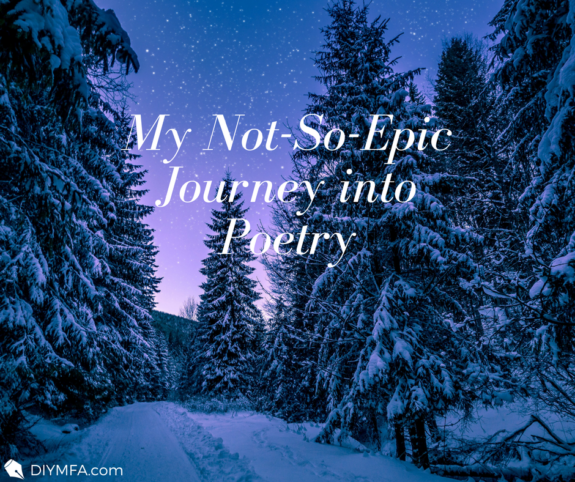Some time ago, I came to a realization that made me go from having a visceral hatred of poetry to suddenly rediscovering its beauty.
The realization was this:
It’s not that I dislike all poetry, I just dislike bad poetry.
Let me backtrack a little bit. It’s 1993 and I’m in ninth grade biology class where Ms. B is trying to explain photosynthesis for the 119th time and I’m desperately trying to stay awake. In a valiant attempt to appear like I am taking notes, I jot down these lines in the margin of my notebook.
Here as I sit I fall into my mind
Where all is pleasant
Nothing wrong can be.But when I wake I’ll be surprised to find
My life has slipped away
Thus leaving meAlone to whisper my last breath
And look upon the face of death.
Yes, I was one melodramatic fifteen-year-old.
As you can see, I should be the last person to complain about bad poetry because I myself was guilty of producing it. I filled the margins of my textbooks and spiral notebooks with cheesy rhymes and glaring cliches. Looking back, my only justification for the rotten fruit of all this writing was that at least it kept my brain working and prevented me from falling asleep in class.
The tricky thing about poetry is since there are so few words and the language is boiled down to its barest essentials, there is no room for carelessness or error. When a poem comes together and works it can take your breath away, but one wrong word and the whole thing falls flat. To paraphrase a nursery rhyme: “when it’s good, it can be very very good, but when it’s bad it’s horrid.”
At the same time, writers tend to pour their souls into poetry in a way that you don’t see happen with prose. This is especially true for novice writers (see my poem above as a perfect example) but it also makes poetry especially challenging to discuss in a workshop setting, because you’re treading that tightrope between wanting to give useful critique but also not wanting to squelch the writer’s soul.
Case in point: in a workshop I took some years ago, one student submitted a novel excerpt that had a poem at the beginning of each chapter. The prose sections of the chapters were great but the poems read like word salad. Immediately, I sensed a certain defensiveness around this student’s work that I didn’t get when reading pieces by the rest of the class. It was as though everyone in the class would back away slowly, trying not to tread on the poem’s toes. After all, this wasn’t fiction, it was poetry and poetry was personal so who were we to critique it? Finally, I raised my hand and said “Um… I’m sorry, but I just don’t get what the poem’s trying to say.” The class struck me down so fast I thought I hallucinated the whole thing.
After this experience began my “two ships passing in the night” relationship with poetry. I assumed that the only reason I didn’t “get” poetry was because I was too stupid to understand it. Clearly everyone else in that workshop understood the cryptic lines so I figured poetry was some sort of code that I was too dumb to crack. In order to avoid further embarrassment, I stayed away from poetry and it stayed away from me.
Then, I discovered Kim Addonizio’s Ordinary Genius and this book completely changed how I look at poetry. I don’t care if you like poetry or not; if you’re a writer, you must read this book. I can tell what you’re thinking just from looking at the title. “This must be one of those warm-and-fuzzy books,” you say. I say sure, it’s like a warm cup of tea you snuggle up with on a snowy day, but we’re talking some serious tea here. Something super-caffeinated, like mate herb. This isn’t just a “get in touch with your inner-poet” sort of book. This book means business.
Ordinary Genius is a combination of analysis and craft. Unlike most books about writing, where you have to work your way in small chunks and do each exercise, you could read this book through to the end as though it were a novel. This book softened the strong distaste I had for poetry. It has showed me that while bad poetry is atrocious, good poetry reverberates in the soul. It’s also taught me that you can’t just slap words down on the page and call it a poem.
After all, many people think
if you stick a few line breaks into
prose, it turns into poetry
like magic.
Now I have always had a tremendous respect for anyone who attempts this genre, since I find it so challenging. Ordinary Genius breaks poetry down to the building blocks, helping me understand what makes one poem sing and another fall flat. Addonizio gives micro-assignments that serve almost more like meditations than poetry exercises. This book is about doing an honest day’s writing; it’s about doing the work, not just reading about it.
At the same time, though, Addonizio doesn’t guilt her readers into writing (as some writing books tend to do). She doesn’t give word minimums or time requirements. The book is approachable. Friendly. It makes you want to wake up and write every day without telling you that you must.
In the end, Ordinary Genius has opened my eyes to the gracefulness of language and the beauty of gesture. Thanks to this little book, I have fallen in love with poetry and–more importantly–I have discovered the music of language all over again.







